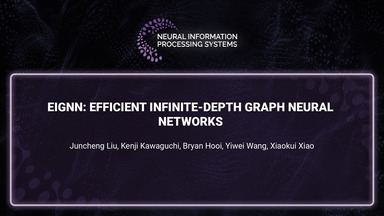Efficient Active Learning for Gaussian Process Classification by Error Reduction
Dec 6, 2021
Speakers
Guang Zhao
Řečník · 0 sledujících
Edward R. Dougherty
Řečník · 0 sledujících
Byung-Jun Yoon
Řečník · 0 sledujících
Francis J. Alexander
Řečník · 0 sledujících
Xiaoning Qian
Řečník · 0 sledujících
About
Active learning sequentially selects the best instance for labeling by optimizing an acquisition function to enhance data/label efficiency. The selection can be either from a discrete instance set (pool-based scenario) or a continuous instance space (query synthesis scenario). In this work, we study both active learning scenarios for Gaussian Process Classification (GPC). The existing active learning strategies that maximize the Estimated Error Reduction (EER) aim at reducing the classification error after training with the new acquired instance in a one-step-look-ahead manner. The computation of EER-based acquisition functions is typically prohibitive as it requires retraining the GPC with every new query. Moreover, as the EER is not smooth, it can not be combined with gradient-based optimization techniques to efficiently explore the continuous instance space for query synthesis. To overcome these critical limitations, we develop computationally efficient algorithms for EER-based active learning with GPC. We derive the joint predictive distribution of label pairs as a one-dimensional integral, as a result of which the computation of the acquisition function avoids retraining the GPC for each query, remarkably reducing the computational overhead. We also derive the gradient chain rule to efficiently calculate the gradient of the acquisition function, which leads to the first query synthesis active learning algorithm implementing EER-based strategies. Our experiments clearly demonstrate the computational efficiency of the proposed algorithms. We also benchmark our algorithms on both synthetic and real-world datasets, which show superior performance in terms of sampling efficiency compared to the existing state-of-the-art algorithms.Active learning sequentially selects the best instance for labeling by optimizing an acquisition function to enhance data/label efficiency. The selection can be either from a discrete instance set (pool-based scenario) or a continuous instance space (query synthesis scenario). In this work, we study both active learning scenarios for Gaussian Process Classification (GPC). The existing active learning strategies that maximize the Estimated Error Reduction (EER) aim at reducing the classification…
Organizer
NeurIPS 2021
Účet · 1,9k sledujících
About NeurIPS 2021
Neural Information Processing Systems (NeurIPS) is a multi-track machine learning and computational neuroscience conference that includes invited talks, demonstrations, symposia and oral and poster presentations of refereed papers. Following the conference, there are workshops which provide a less formal setting.
Like the format? Trust SlidesLive to capture your next event!
Professional recording and live streaming, delivered globally.
Sharing
Recommended Videos
Presentations on similar topic, category or speaker
Closing remarks
Zhlédnout později
Pro uložení prezentace do věčného trezoru hlasovalo 0 diváků, což je 0.0 %
EIGNN: Efficient Infinite-Depth Graph Neural Networks
Zhlédnout později
Juncheng Liu, …
Pro uložení prezentace do věčného trezoru hlasovalo 0 diváků, což je 0.0 %
Meta-Learning Sparse Implicit Neural Representations
Zhlédnout později
Jaeho Lee, …
Pro uložení prezentace do věčného trezoru hlasovalo 0 diváků, což je 0.0 %
Coding Session 2
Zhlédnout později
Shirley Ho, …
Pro uložení prezentace do věčného trezoru hlasovalo 0 diváků, což je 0.0 %
Dual-stream Network for Visual Recognition
Zhlédnout později
Mingyuan Mao, …
Pro uložení prezentace do věčného trezoru hlasovalo 0 diváků, což je 0.0 %
Bias Correction Methods
Zhlédnout později
Pro uložení prezentace do věčného trezoru hlasovalo 0 diváků, což je 0.0 %





